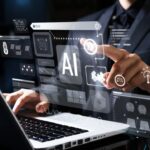
- October 9, 2024
1. Introduction
Today, data science, artificial intelligence (AI), and machine learning (ML) have all become buzzwords. We all talk about these technologies but none of us completely understands. To a layman, these terms appear to be extremely complicated.
Many of these buzzwords sound the same to a non-technical business executive or student. Words like AI, ML, and data science are often misunderstood. We describe these innovations in basic terms in this blog so that you can easily understand the differences and how they are used in the industry.
2. What is data science?
Data science is the process of extracting useful information from large amounts of data. Mathematics, computer programming, machine learning, data engineering and visualization, mathematical modelling, uncertainty modelling, pattern recognition and learning, data warehousing, and cloud computing are among the techniques used.
While big data is not needed for data science, the fact that data is growing makes it an essential aspect of the field. Among AI, ML, and itself, data science is the most commonly used data-driven technique. Data scientists usually have a background in mathematics, statistics, and programming (although expertise in all three is not required). Data scientists work with large amounts of data to uncover trends, observations, and correlations that are useful to businesses.
3. What is machine learning?
Machine Learning (ML) is a computer system’s ability to learn from its environment and develop itself through experience without the need for explicit programming. Machine learning focuses on allowing algorithms to learn from the data given, gather observations, and make predictions based on the information gathered. Machine learning can be performed in a variety of ways. Supervised, unsupervised, and reinforcement learning are the 3 basic machine learning models.
4. What is artificial intelligence?
The simulation of a human brain function by computers is known as artificial intelligence (AI). This is accomplished by developing an artificial neural network capable of demonstrating human intelligence. Logical thinking, learning, and self-correction are some of the most basic human functions that an AI computer can perform.
Artificial intelligence is a broad area with numerous applications, but it is also one of the most difficult technologies to develop. Machines aren’t smart by nature, and to make them smart, we’ll need a lot of computational power and data to allow them to think like humans.
General Artificial Intelligence and Narrow Artificial Intelligence are the 2 types of artificial intelligence. General AI refers to the process of making machines intelligent in a variety of tasks that include thought and reasoning. Narrow AI, on the other hand, is the systematic use of artificial intelligence to a very specific task.
5. The difference between data science, machine learning, and artificial intelligence:
Data science isn’t quite a branch of machine learning, but it does make use of it to evaluate data and make predictions. Machine learning is combined with other disciplines such as big data analytics and cloud computing. Data science is a realistic application of machine learning that focuses entirely on resolving real-world issues.
Artificial intelligence is a broad concept that encompasses a wide range of applications, from robotics to text analysis. It is still a developing technology, and there are debates on whether we should strive for high-level AI or not. Machine learning is a branch of artificial intelligence that focuses on a specific set of tasks. In reality, it is the only true artificial intelligence with some applications to solve real-world problems.
At Visvero, we concentrate on creating cutting-edge solutions that take advantage of these innovations and assist you in solving real-world business problems. Please contact us if you are searching for a company that can make sense out of your data and provides you with business-relevant insights.



